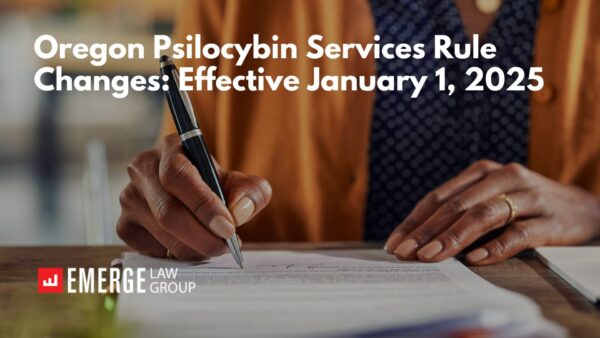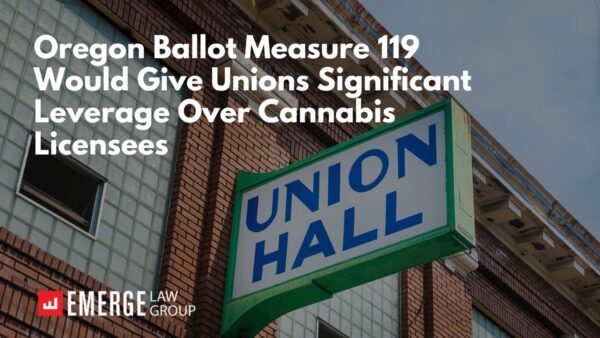Unless you’ve been living under Haystack Rock for the last year and a half, if you’re in the cannabis business you know that Oregon has a “marijuana overproduction problem.” This has been forcing down prices, accelerating market consolidation, and leading many smaller grow operations to permanently shutter their commercial grade, non-residential locked gates. The Oregon Legislature has been under increasing pressure from both the industry and the feds to stem the flow of excess marijuana out of the state through illegal channels.
So, you’ve also probably heard rumors about the legislature planning to address the problem by “capping licenses.” We have been receiving increasingly frantic calls and emails from clients hearing all sorts of rumors about the potential caps and how they might affect their existing licenses and applications. Although it’s impossible to tell exactly what the legislature will do at this point in the 2019 session, we’d like to address some of the rumors we’ve heard about the bill proposing the cap – SB 218.
Myth #1 – The caps will apply to all license types.
False. SB 218 only applies to production (grower) licenses.
Myth #2 – The caps will apply to renewal and other non-initial license applications.
False. Although the original bill language refers only to OLCC refusing to “issue production licenses,” the legislative committee taking up the bill adopted an amendment that provides the following exceptions from the cap: (1) renewals; (2) licenses issued due to changes of ownership (sales of existing licenses); or (3) licenses issued due to changes of location of existing licensed premises. So, if SB 218 passes, the cap will only apply to initial applications.
Myth #3 – The cap will be imposed immediately upon passage of the bill and affect applications already in the pipeline.
Probably False. SB 218 becomes effective immediately upon passage. However, the bill does not by itself cap the issuance of production licenses. Rather, it gives the OLCC discretion to cap production licenses based on the “supply of and demand for marijuana” and “other relevant factors.” The bill also provides for the OLCC to adopt rules implementing the bill, including rules about notifying the public prior to imposing a cap. Therefore, if SB 218 passes, there will likely be some lag time between the bill’s effective date and OLCC’s implementation.
Further, for reasons of fairness, the OLCC usually implements new legislation prospectively. In other words, the OLCC will likely apply the cap only to applications submitted after the bill passes, or, at least applications submitted after the June 15, 2018 “application moratorium” deadline published last spring. Applications that were submitted before June 15 of last year – and certainly applications that have already been assigned – will probably not be subject to any cap.
Myth #4 – Producers must prove they can sell a percentage of their product to avoid the cap.
Probably False. An amendment was introduced, reportedly by a single large, vertically integrated operation which requires, in order to receive an initial or renewal license, a producer to first provide proof that the producer has contracted with a processor or retailer to transfer at least 90 percent of the marijuana that it will produce during the life of the license. The amendment includes an exception for producers that own, or are owned by a retailer or processor (vertically integrated). In our opinion, the legislature probably won’t adopt this amendment because: (1) at a public hearing the legislative committee expressed serious reservations about the amendment; (2) the amendment wholly excludes contracts with wholesalers, with whom producers often contract to sell their product; (3) it seems virtually impossible to prove that 90% of a future crop is contracted to sell before it’s even cultivated; and (4) the OLCC generally avoids involvement with private contractual agreements between licensees.
To conclude, the legislature will likely pass SB 218 (or a similar bill) that gives the OLCC discretion to cap only initial production licenses. The cap will probably not affect producer applicants who have applications that are assigned at the time of passage and may not affect applications submitted prior to the June 15, 2018 moratorium. The cap will probably not go into effect immediately upon bill passage. And, it is highly unlikely that producers will have to prove to OLCC that they have contracts to sell a percentage of their crop prior to receiving an initial or renewal license.
We are monitoring this and other pending 2019 legislation closely and will keep you updated throughout the session. Please contact one of our compliance attorneys if you have any questions about pending legislation or any other compliance or licensing matter.





